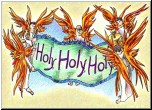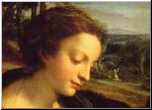Students of ancient science are bewildered by the
simultaneous perplexity, 'How can they have known so much?' and 'How can
they have believed that?' An entry in the latter category is
Aristotle's insistence upon spontaneous generation, even against those
of his contemporaries who gently suggested the pond was stocked with
living things whose eggs and spores had survived dessication. The
problem: a mud puddle or small pond, teeming with life, dries up completely in the hot Mediterannean
sun. This condition persists for several months; inspection reveals
nothing but dry, hard baked, cracked clay. Then one day there is a
torrential down-pour, the puddle is refilled, and almost before it has
stopped raining, the observer sees signs of life. Within days, the pond
is fully re-stocked with living creatures ranging from pond-scum to highly
organized creatures such as insects; even little amphibians begin tentatively
darting around. Nature's productive resources are so prompt and overpowering that this feat of
creation, making living creatures out of bare mud, did not take aeons, but a
day!
"However, there are some fish that proceed from mud and
sand, even of those kinds that proceed also from pairing and the egg.
This occurs in ponds here and there, and especially in a pond in the
neighborhood of Cnidos. This pond, it is said, at one time ran dry about
the rising of the Dog-star, and the mud had all dried up; at the first
fall of the rains there was a show of water in the pond, and on the
first appearance of the water shoals of tiny fish were found in the
pond." (Aristotle, History of Animals, Book VI, Chapter 15).
Aristotle persuaded everyone until Louis Pasteur in the nineteenth
century convinced them that this does not happen.
An interesting off-site resource for further study of ancient science:
|





